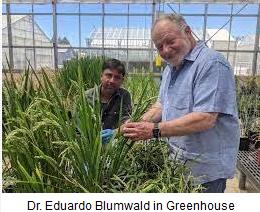Application of CRISPR technology has enabled scientists at the University of California, Davis to develop a strain of rice that can fix nitrogen with the aid of soil bacteria, thereby reducing the levels of application of nitrogen fertilizers. The studies conducted by the group were recently published in Plant Biotechnology. Roots of plants cannot directly fix nitrogen but rely on uptake of organic ‘fixed’ compounds either supplied as artificial fertilizers or by bacteria in soil.
 Eduardo Blumwald, Distinguished Professor of Plant Sciences the leader of the research team noted, “Plant are incredible chemical factories.” He explained that by application of chemical screening and genomics, it was possible to identify the role of apigenin and other flavone compounds that enhance biofilm formation thereby promoting the activity of diazotrophic bacteria that fix nitrogen. By modifying apigenin, it was possible for plants to enhance the nitrogen-fixing activity of bacteria on root surfaces.
Eduardo Blumwald, Distinguished Professor of Plant Sciences the leader of the research team noted, “Plant are incredible chemical factories.” He explained that by application of chemical screening and genomics, it was possible to identify the role of apigenin and other flavone compounds that enhance biofilm formation thereby promoting the activity of diazotrophic bacteria that fix nitrogen. By modifying apigenin, it was possible for plants to enhance the nitrogen-fixing activity of bacteria on root surfaces.
A patent application for the technology has been filed by the University of California.
Implications arising from the study have profound implications for agriculture since it will be possible to lower the cost of production of rice and possibly other crops by reducing the application levels of nitrogen fertilizers. This in turn will reduce leaching of nitrogen into soils and ground water and diminish eutrophication of waterways as a result of runoff of fertilizer.